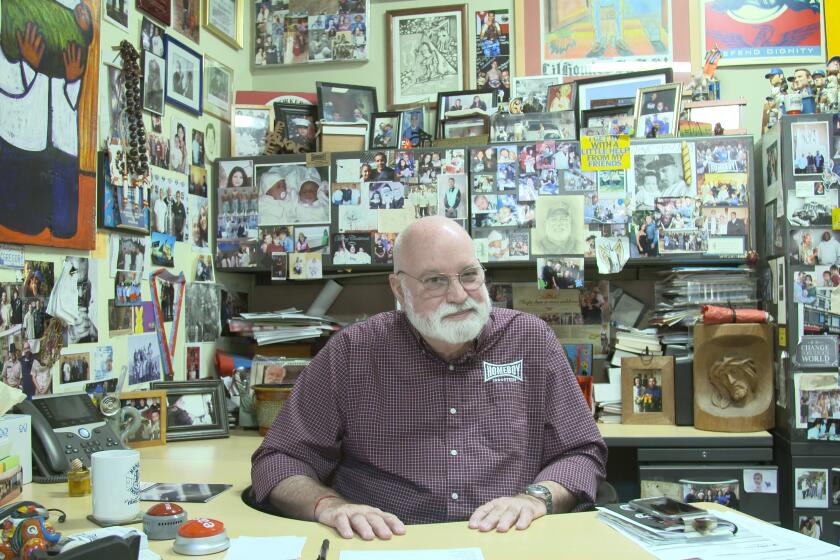Deal Would Hike Retirement Pay for Official : Government: Outgoing county health director negotiates a lucrative compensation package. High Desert Hospital faces budget ax.
Los Angeles County Health Director Robert C. Gates, who has announced that he will step down in November, would receive a $25,000 pay boost and a lucrative retirement package under an agreement brokered with county officials and revealed Thursday.
Details of his recommended compensation package came on the same day that Gates appeared before the Board of Supervisors with a proposal to vastly reduce the scope of medical services at county facilities.
Under the agreement, which the board will formally consider Tuesday, Gates’ salary at retirement would increase from $152,110 to $177,679. That boost would allow Gates to receive a retroactive cost-of-living increase to be paid in a lump sum of $15,854. It also would increase his monthly pension check to $5,998 from $5,134.
Gates’ past performance evaluations have included some criticism of his stewardship of the department, county supervisors and Chief Administrative Officer Sally Reed said. The proposed agreement, which Reed drafted, would amend his 1993 and 1994 performance ratings upward to the category of “fully meets expectations.”
Gates would not comment on his retirement package Thursday, and the supervisors declined to discuss the deal in detail. However, the consensus among the elected leaders is that the agreement would benefit the county and Gates. Rank-and-file health workers--and the public they serve--may be less than pleased, however, with the retirement package at a time of severe cutbacks.
Union officials said they were dismayed by the terms and the timing of the retirement deal. “This has been a terrible day,” said Ramon Rubalcava, a researcher for Local 660 of the Service Employees International Union, which represents about 40,000 county workers.
Officials said concerns were mounting about Gates’ health and the county’s liability should the director suffer another collapse such as one that occurred in January during a heated exchange at a board meeting.
Several supervisors, who did not want to be identified by name, said support for the embattled health director had reached a low ebb among a majority of supervisors, who made it clear to Gates that they wished he would go. The agreement brokered with Gates is less costly than if the county had tried to fire him, these officials said.
Reed said Thursday that Gates had initiated talks that led to his impending departure, expressing frustration that his efforts were not adequately appreciated.
“He felt there was a failure to grant the kind of evaluation he felt he was entitled to and that was a problem for him,” Reed said. “He thought it was unfair given his record and that it made it difficult for him to feel satisfied staying on.”
Supervisor Yvonne Brathwaite Burke agreed that some supervisors had a problem with Gates’ performance.
“Part of those [performance] ratings reflected the fact that we were sending back so much [grant] money to the feds and that there also were grants we weren’t getting,” she said. “There were a lot of frustrations in terms of the whole department.”
But Gates had his defenders.
“I like Bob and think that he was competent, resourceful in getting state and federal monies, and that his reputation throughout the county was reasonably good,” Supervisor Zev Yaroslavsky said. “He was in an extremely difficult job running one of the largest health departments in the nation.”
*
An aide to one county supervisor, who requested anonymity, said one reason Gates wants to retire is the contentious professional relationship he has had with Supervisor Gloria Molina for the past several years.
“She never trusted him, and I don’t think it helped that he had to come here week after week to be shouted at and criticized by her,” the official said.
The final straw, the aide said, might have been when Gates passed out at a supervisors’ meeting in January, after intense questioning by Molina, who later apologized and adopted a softer tone in her encounters with Gates. Molina was ill Thursday and not available for comment.
When Gates collapsed, the board was debating the health department’s projected $100-million to $600-million 1995-96 deficit.
As details of Gates’ departure are ironed out, the board continues to grapple with that problem.
When he addressed the supervisors Thursday on his department’s fiscal plight, Gates made no mention of his impending retirement. The supervisors also limited their comments to the serious cutback proposals at hand.
The health director has proposed that the county slash $100 million from the department’s budget.
There appears to be sentiment among a board majority, led by Yaroslavsky, to move forward Tuesday with a series of sweeping reductions that would include closing High Desert Hospital and 14 comprehensive health centers and eliminating some hospital outpatient and public health services as well as the entire skilled nursing facility at Rancho Los Amigos Medical Center.
Gates said the cuts are unavoidable.
But he exhibited a new, more aggressive stance that indicates that he does not want to become a scapegoat for the county’s health care crisis. He said supervisors in the past have been reluctant to make tough decisions.
“The county’s failure to come to grips with [federal and state] funding losses and to make curtailments is coming back to haunt them,” Gates said after the public hearing. “It suddenly looks like we have a $600-million problem, but this has happened over many years.”
In addition to High Desert, county health centers in Canoga Park and Burbank have also been slated for possible closure this summer.
Shutting down the Canoga Park clinic, which handled about 31,000 patient visits last year, would save the county about $1.5 million, according to health department documents. Closing the Burbank clinic would save about $370,000. It handles about 14,000 visits each year.
But it would be the closure of High Desert Hospital, situated in an isolated part of Lancaster next to a state prison, that would most dramatically impact poor people seeking health care, county officials said.
“You would seem to exacerbate the problem if you cut off those who are the greatest distance from health services,” said Supervisor Mike Antonovich, who represents the area.
“We have to look at how smart it is to close a hospital in a rural, isolated community,” said Kathryn Barger, Antonovich’s health aide.
Things have been rocky for several months for the hospital, which has outgrown its original building and has several facilities located in trailers.
In April, a county audit found widespread mismanagement at the hospital, including failure to remove a physician charged with sexual battery from patient care duties. The board of supervisors unanimously called for the resignation of the hospital’s administrator and associate administrator.
The administator, Roy Fleischman, is scheduled to step down on June 1, county officials said.
If the hospital is shut down, plans for a larger facility a few miles from the current hospital will be scaled back, or scrapped altogether, said Walter Gray, the health department’s associate administrator in charge of hospitals.
“We might try to reconfigure the new hospital, maybe by making it for outpatient services only,” said Gray.
*
To help offset the closure, Gray said the health department would probably expand the services it offers at a county-run clinic in central Lancaster. Another possibility, said Gray, is for the county to pay the privately operated Antelope Valley Hospital to care for poor patients.
Currently, the county reimburses Antelope Valley Hospital for indigent patients who use its emergency room. The two hospitals also operate a joint obstetrics/pediatrics program for the poor and uninsured.
Still, Gray said, shutting High Desert would leave many poor people from the Santa Clarita and Antelope valleys without nearby medical service.
“The real problem is indigents,” Gray said, referring to people who have neither insurance nor money for health care. “The nearest facility for them is going to be Olive View [medical center in Sylmar]. That’s a 40-minute drive, and [the Antelope Valley Freeway is] inaccessible by weather sometimes.”
Times staff writer Timothy Williams contributed to this story.
More to Read
Start your day right
Sign up for Essential California for news, features and recommendations from the L.A. Times and beyond in your inbox six days a week.
You may occasionally receive promotional content from the Los Angeles Times.







